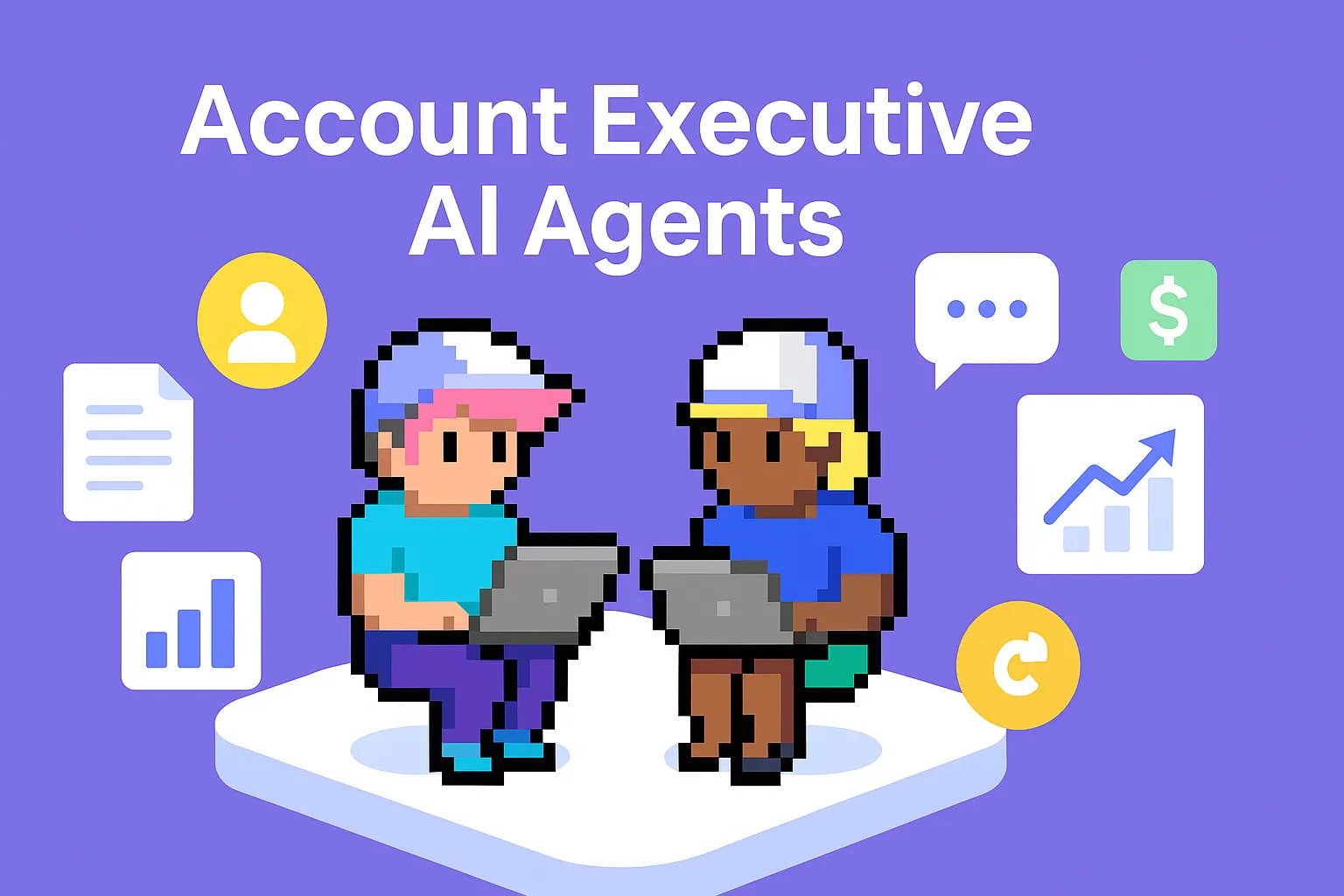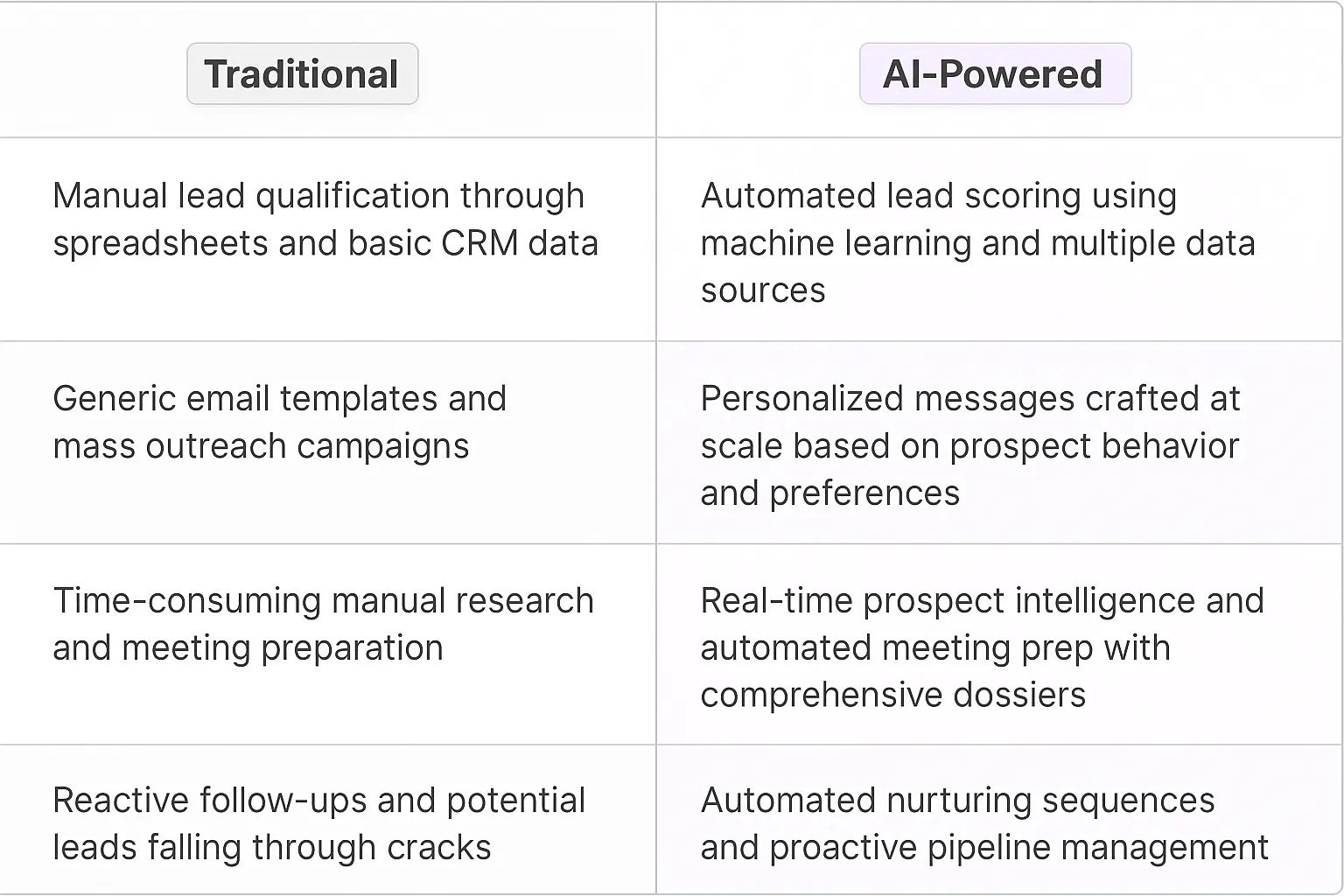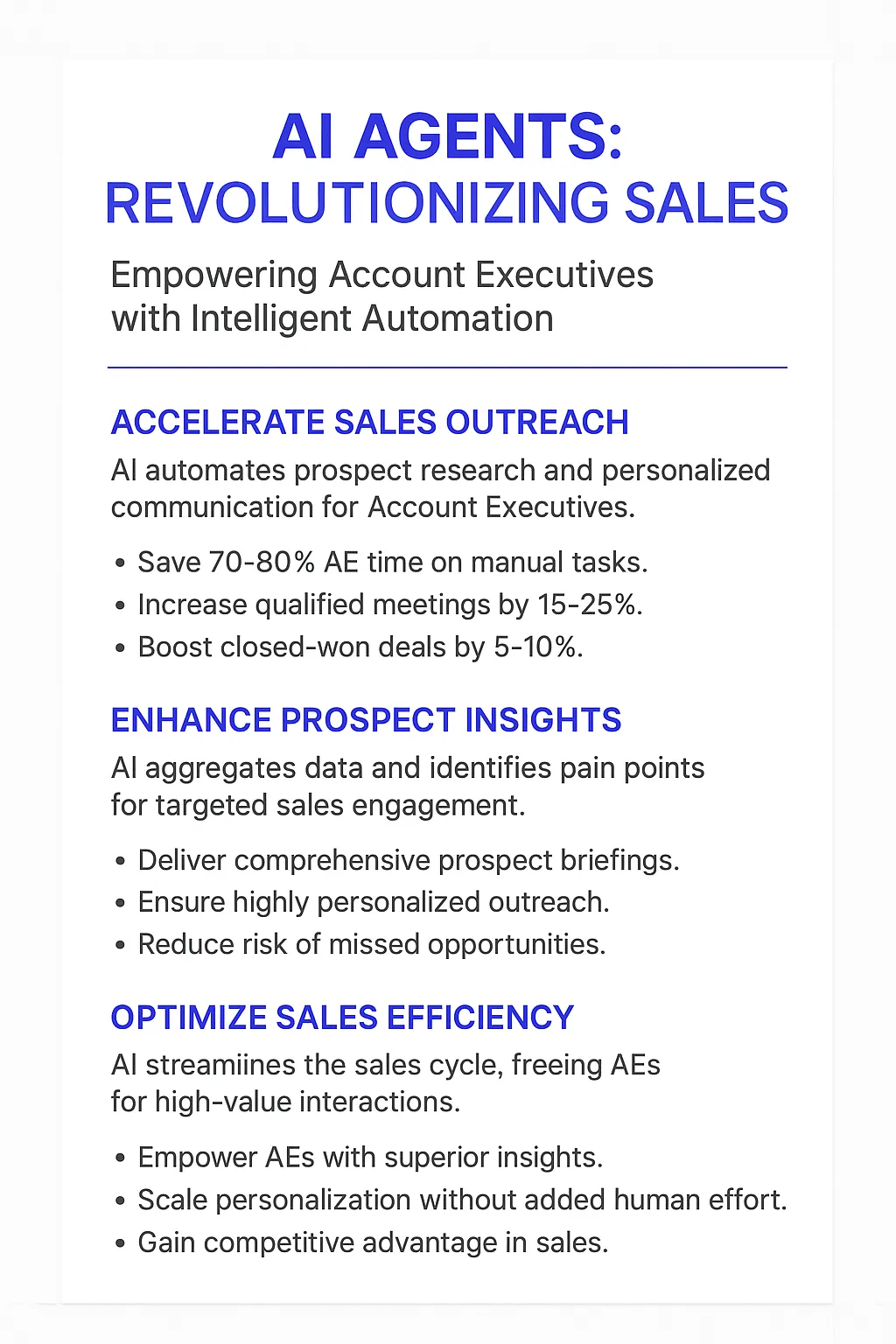An Account Executive is a professional responsible for managing and developing relationships with clients, typically in sales-oriented industries such as advertising, marketing, or technology. Their primary role is to serve as the main point of contact between a company and its clients, ensuring client satisfaction and driving revenue growth. Account Executives work closely with various internal teams to understand client needs, develop tailored solutions, and maintain long-term partnerships. They are often tasked with meeting sales targets, identifying new business opportunities, and nurturing existing accounts to maximize their potential. Successful Account Executives possess excellent communication skills, a deep understanding of their industry, and the ability to build strong, trust-based relationships with clients.

Before AI agents entered the scene, account executives relied on a hodgepodge of tools and manual processes. They'd spend hours sifting through CRM data, crafting personalized emails, and juggling multiple spreadsheets. It was like trying to paint a masterpiece with a toothbrush – possible, but painfully inefficient.
The typical day involved endless context-switching between tasks, from researching prospects to updating pipeline forecasts. Account executives were essentially playing whack-a-mole with their responsibilities, never quite feeling on top of their game.
Enter AI agents – the secret weapon that's transforming account executives into sales ninjas. These digital teammates are like having a team of expert analysts, writers, and strategists at your fingertips 24/7.
First off, AI agents are crushing the research game. They can dive deep into prospect data, industry trends, and competitive landscapes in seconds, surfacing insights that would take humans hours to uncover. This means account executives can walk into every meeting armed with razor-sharp insights, ready to add real value from the get-go.
But it's not just about information gathering. These AI agents are also masters of personalization at scale. They can craft tailored outreach messages that hit the right notes for each prospect, balancing between being informative and persuasive. It's like having a ghostwriter who knows your style and your audience intimately.
Perhaps the most game-changing benefit is how AI agents handle the grunt work. They can automate follow-ups, schedule meetings, and even provide real-time coaching during calls. This frees up account executives to focus on what they do best – building relationships and closing deals.
The result? Account executives are seeing their productivity skyrocket. They're able to manage larger pipelines, engage more meaningfully with prospects, and ultimately, close more deals. It's not about replacing the human touch – it's about amplifying it.
In essence, AI agents are turning account executives into superhuman versions of themselves. They're not just tools; they're force multipliers that are redefining what's possible in sales. As these AI agents continue to evolve, we're likely to see a new breed of account executives emerge – ones who are more strategic, more insightful, and more successful than ever before.

AI agents are reshaping the landscape for account executives, offering a new paradigm in customer relationship management and sales optimization. These digital teammates can handle complex, data-driven tasks that traditionally consumed hours of an AE's day. By leveraging machine learning and natural language processing, AI agents can analyze vast amounts of customer data, identify patterns, and generate actionable insights in real-time.
One of the most impactful use cases is in lead qualification and prioritization. AI agents can sift through mountains of data points - from social media activity to company financials - to score leads based on their likelihood to convert. This allows AEs to focus their energy on the most promising opportunities, dramatically increasing their efficiency and hit rate.
Another game-changing process is automated follow-ups and nurturing. AI agents can maintain consistent communication with prospects, sending personalized messages at optimal times based on the prospect's behavior and preferences. This ensures no lead falls through the cracks and keeps the sales pipeline flowing smoothly.
On a more granular level, AI agents excel at handling specific tasks that can make or break an AE's performance. Take meeting preparation, for instance. An AI agent can compile comprehensive dossiers on prospects, including recent news, social media updates, and company developments. This allows AEs to walk into every meeting armed with the most up-to-date and relevant information, fostering deeper connections and more meaningful conversations.
Contract generation and customization is another area where AI agents shine. By understanding the nuances of different deals and client preferences, these digital teammates can draft tailored contracts in minutes, a task that might take an AE hours. This not only speeds up the sales cycle but also reduces the risk of errors and oversight.
Perhaps one of the most valuable tasks an AI agent can perform is competitive analysis. By continuously monitoring competitor activities, pricing changes, and market trends, AI agents can provide AEs with real-time intelligence. This empowers AEs to adjust their strategies on the fly, address potential objections before they arise, and position their offerings more effectively against the competition.
The integration of AI agents into an AE's workflow isn't about replacing human touch - it's about amplifying it. By offloading time-consuming, data-heavy tasks to AI, account executives can focus on what they do best: building relationships, understanding client needs, and closing deals. As these AI agents continue to evolve, we're likely to see a new breed of super-powered AEs who can manage larger portfolios, close deals faster, and drive unprecedented growth for their organizations.

AI agents are reshaping the landscape for Account Executives across various sectors. These digital teammates aren't just tools; they're game-changers that are redefining how AEs operate and succeed. Let's dive into some concrete, industry-specific scenarios where AI agents are making waves:
In tech, financial services, healthcare, and beyond, AI agents are becoming indispensable partners for Account Executives. They're not replacing human expertise but amplifying it, allowing AEs to focus on what they do best: building relationships and closing deals. The following use cases illustrate how AI is transforming the day-to-day operations of Account Executives, making them more efficient, informed, and effective in their roles.
The real estate industry is ripe for disruption, and Account Executive AI Agents are poised to be the game-changers. These digital teammates are not just another tech fad; they're the secret weapon that top-performing real estate firms will leverage to dominate their markets.
Consider the typical day of a real estate account executive: juggling multiple property listings, coordinating viewings, negotiating deals, and maintaining client relationships. It's a high-stakes dance that requires precision, persistence, and personalization. This is where AI agents step in, not to replace human expertise, but to amplify it exponentially.
These AI agents can analyze vast amounts of property data, market trends, and client preferences in milliseconds. They can predict which properties are likely to interest specific clients before the clients even know it themselves. Imagine an AI that sends personalized property recommendations to clients at 2 AM, right when they're browsing Instagram and dreaming about their future home.
But it doesn't stop there. These digital teammates can handle the grunt work of scheduling viewings, freeing up human account executives to focus on high-value interactions. They can even provide virtual property tours, complete with AI-generated staging options tailored to each client's taste.
The real magic happens in deal negotiations. AI agents can analyze historical transaction data, current market conditions, and even subtle cues from client communications to suggest optimal negotiation strategies. It's like having a seasoned mentor whispering advice in your ear during every deal.
For the real estate firms that embrace this technology, the results will be transformative. Increased deal velocity, higher client satisfaction, and a reputation for being at the cutting edge of the industry. The firms that don't adapt? They'll be left wondering why their competitors seem to have an almost supernatural ability to close deals and attract clients.
This isn't just about efficiency; it's about creating a new paradigm in real estate. One where AI and human expertise combine to create experiences that were previously impossible. Welcome to the future of real estate, powered by Account Executive AI Agents.
The wealth management industry is on the brink of a seismic shift, and Account Executive AI Agents are the catalysts. These digital teammates aren't just another fintech gimmick; they're the secret sauce that will separate the industry leaders from the laggards.
Think about the daily grind of a wealth management account executive: balancing complex portfolios, staying ahead of market trends, and nurturing high-net-worth client relationships. It's a high-wire act that demands precision, foresight, and a personal touch. This is where AI agents become the ultimate wingman, not replacing human expertise, but amplifying it to superhuman levels.
These AI agents can crunch massive datasets of market indicators, economic trends, and individual client portfolios in real-time. They can spot emerging opportunities or potential risks before they even register on human radar. Picture an AI that sends tailored investment recommendations to clients at 11 PM, right when they're winding down and contemplating their financial future.
But that's just the beginning. These digital teammates can handle the heavy lifting of portfolio rebalancing and tax-loss harvesting, freeing up human account executives to focus on building deeper client relationships. They can even conduct AI-powered risk tolerance assessments, adapting investment strategies to subtle shifts in client sentiment.
The real game-changer is in client communication. AI agents can analyze years of interaction history, market conditions, and even tone in email exchanges to suggest perfectly timed and worded client outreach. It's like having a team of elite relationship managers working 24/7 for every single client.
For wealth management firms that embrace this technology, the impact will be profound. Expect to see increased assets under management, higher client retention rates, and a reputation for being the Tesla of financial services. The firms that drag their feet? They'll be left wondering why their competitors seem to have a crystal ball for market trends and client needs.
This isn't just about automating tasks; it's about creating a new paradigm in wealth management. One where AI and human expertise synergize to deliver a level of service and performance that was previously in the realm of science fiction. Welcome to the future of finance, where Account Executive AI Agents are the new power players.
Implementing an Account Executive AI Agent isn't just about slapping some machine learning models together and calling it a day. It's a complex dance of data, algorithms, and user experience that requires serious technical chops.
First off, you're dealing with the challenge of natural language processing. Your AI needs to understand the nuances of human communication, from decoding email sentiment to picking up on subtle cues in voice calls. This isn't just about keyword matching; it's about grasping context, intent, and even the unspoken subtext that often drives deals forward.
Then there's the data integration nightmare. Your AI agent needs to pull information from CRMs, email servers, calendar apps, and probably a dozen other sources. Each of these systems speaks its own language, has its own quirks, and comes with its own set of API headaches. Getting them all to play nice together is like herding cats – if the cats were also trying to solve differential equations.
Let's not forget about the machine learning models themselves. Training an AI to be an effective Account Executive requires massive amounts of high-quality data. You need examples of successful and unsuccessful sales interactions, deal histories, and customer profiles. And this data needs to be clean, labeled, and representative of your target market. If your training data is biased or incomplete, your AI will be about as effective as a salesperson who slept through orientation.
On the operational side, things get even trickier. You're essentially asking your human Account Executives to trust a digital teammate with their livelihoods. That's a tough sell, no pun intended.
Change management becomes crucial. You need to convince your sales team that this AI isn't here to replace them, but to make them more effective. It's like telling a chef you're giving them a sous-chef who's a robot – there's going to be some skepticism and resistance.
Then there's the question of how to integrate this AI into existing workflows. Do you have it operate in the background, quietly suggesting next steps to AEs? Or do you make it more front-and-center, allowing it to interact directly with clients? Each approach comes with its own set of challenges and potential pitfalls.
You also need to consider the ethical implications. How much autonomy do you give this AI? Can it make decisions about discounts or contract terms? What happens if it makes a mistake or offends a client? The line between empowering your AI and maintaining human oversight is razor-thin, and you'll need to walk it carefully.
Finally, there's the ever-present challenge of measuring success. How do you attribute wins (or losses) between the AI and human AEs? How do you quantify the AI's contribution to pipeline growth or deal velocity? Without clear metrics, you risk creating a black box that neither your sales team nor your executives trust.
Implementing an Account Executive AI Agent is a journey fraught with technical and operational hurdles. But for those who can navigate these challenges, the potential rewards – in terms of efficiency, scalability, and revenue growth – are enormous. It's not for the faint of heart, but then again, neither is disrupting entire industries.
Change management becomes crucial. You need to convince your sales team that this AI isn't here to replace them, but to make them more effective. It's like telling a chef you're giving them a sous-chef who's a robot – there's going to be some skepticism and resistance.
Here is the extracted conclusion section formatted as requested:
AI tools like DALL-E, Midjourney, and Stable Diffusion are revolutionizing the creative process, offering artists and designers new ways to explore ideas and bring their visions to life. These technologies excel at generating variations, filling in details, and sparking inspiration. However, they still rely on human input and direction to produce meaningful work. The most impactful creations will likely come from artists who skillfully combine AI capabilities with their own artistic vision, technical skills, and understanding of aesthetics and culture. As these tools continue to evolve, creatives who embrace them as part of their workflow will be well-positioned to push the boundaries of art and design in exciting new directions.